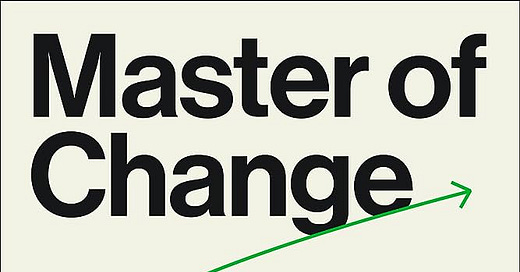Thoughts on Master of Change by Brad Stulberg
Half-way thoughts for being half-way through the book (and podcast)
In the opening pages of Brad Stulberg’s “Master of Change,” he discusses the concepts of homeostasis and allostasis. Brad explains that, homeostasis, which he argues is something that the typical human being is a little bit more familiar with than allostasis, is “the tendency of living systems to resist change in order to maintain stable, relatively constant internal environments.” In his new book, he provides the example of being sick, as when we’re ill, and develop a fever, our body works hard to return ourselves to our normal body temperature of 98.6 degrees fahrenheit. On the other hand, allostasis, which stems from the Greek words, allo, meaning “variable”, and, stasis, meaning, “standing”, is defined as, “stability through change.”
So, why does Brad introduce us to these science-y concepts at the beginning of a self-help / wellness book? Well, because he wants to make the point that, while, we’re more inclined to think that the human condition should be homeostatic, whereas, we go from order to disorder back to order. He makes the argument that allostasis, which is order to disorder to reorder, is far more common and needed, especially during tumultuous, difficult times.
I found this quite pertinent to me, especially, after hearing Brad further articulate these thoughts on his recent appearance on Rich Roll’s podcast. As, personally, I’ve found myself resist change in the past, particularly the past few years of my life. Brad notes that the average person will go through about 36 disorder events over the course of their adulthood. That’s about 1 every 18 months, and is something that he defines as, “something that fundamentally shifts our experience of ourselves and the world we inhabit, sometimes for better, and sometimes for worse.” This could include things like, getting married, losing a job, getting injured, or even, war, climate crisis, or a pandemic - something that we’re all too familiar with.
For Brad, much of this book was written during and a little after the pandemic, as he kept seeing headlines read: “When are we going back to normal?” and as he said on the podcast with Rich, he thought to himself something like, “I don’t think we’re going back to normal… and, that’s kind of ok.” Rather, than resist the change stemming from the pandemic, and other disordered events that were occurring in his life at the time, he chose instead to work with them. He referred to this as, having rugged flexibility, which to him meant, “being able to thrive through change.”
One example he provided of this, and maybe my favourite example from the book yet, is the story of Nils Van Der Poel. Nils, is a Swedish Olympic gold medalist, that aimed to have some adaptability, or shall we day, rugged flexibility, in the lead-up to the 2022 Winter Olympics. Rather, than solely just live, breathe, and be speed-skating, his chosen sport, he chose to find some semblance of balance, or rather, a safety net, if all did not go well in his training and event. He and his coach decided to implement a training program entitled, 5:2. The program was designed for him to train hard for 5 days of the week, like really hard, and then kick-back, have fun, and socialize for the other 2 days of the week, otherwise known as, the week-end. Nils was excited to try this, as in the past, he too closely tied his identity to speed-skating, which didn’t work well for his emotional state. This time though, he decided to choose a more flexible path, whereas, if the training wasn’t going well, he’d have other parts of his life, that might be, like seeing his friends on weekends. In the end, this new path worked. Nils ended up not only winning gold medals in both long and short-distance races, and setting a world record, but he “suffered neither grandiosity nor post-Game depression.” Furthermore, and I think this needs to be added here, he even gave away one of his medals to the daughter of a jailed Chinese human rights activist stating that, “it’s surreal giving away what you fought for your entire life, but it also brings a lot more value to the journey - that it’s not just me skating around in circles.”
Brad has always been one of my favourite writers, dating back to his work “Peak Performance.” I think one of the coolest parts for me is seeing the evolution from both of us, from merely, sports performance geeks to individuals trying to understand and develop different identities and buckets of ourselves, as evidence by Brad literally writing a book on this topic. For Brad, I think a lot of that growth stems from not resisting change, and rather, embracing his growth and maturity, something that I’m trying to do as well. I guess, I like to think that we’re both trying to move from merely homeostatic to allostatic beings, or rather, should I say, just be ruggedly flexible dudes, who are more than just writers, athletes, and the like.




Well written Matt!